I remember noticing, at the beginning of the horror last Tuesday, that the US media were obsessed with looting. The reporters on the ground were trying to talk about a broad range of evacuation problems, while the anchors sitting in their New York studios kept focusing on looting -- how's the looting, any signs of looting, where are the looters, did you get any video of looting...on and on and on.
I remember noticing, at the height of the horror last Thursday, that it was very odd and tragic that people didn't just walk out of New Orleans by themselves. I thought maybe some had but there were just too many old people and babies left to make it.
Now both the things have turned out to be part of the same story -- the inner city mob myth. An inordinate and excessive fear of looters caused good-ole-boy police in the suburban neighbourhoods surrounding New Orleans to set up barricades which prevented the poor people of New Orleans from walking out to safety. Kevin Drum posts "Savagery...a followup..." which covers some of the details.
Its all part of this "inner city mob" myth in American culture -- the apparently primal fear of suburbia that a mob of rampaging, looting, screaming, tire-iron-clutching black people are going to come running down their street -- breakin' windows and rapin' women and crushin' the flowerbeds and tailored lawns.
Disaster planning in the US doesn't seem to have acknowledged the power of this myth. It may well have been a major factor in the disaster that was New Orleans, and certainly would be a factor in many many other US cities -- where the central areas of the city are populated primarily by poor black people while wealthier white people live in the surrounding suburbs and have white police forces who know their job is to protect suburbia from the black mobs. So in American cities, if something disasterous happens which creates refugees in the city core, the disaster will be compounded because the suburbs will be too afraid to let their neighbours in.
And I call it a myth because it is -- I am no expert on American history but when was there ever an example of an inner city mob which rampaged around the suburbs? I can't think of one. All the mobs I remember seeing on TV -- Detroit, Watts, the Rodney King riots, etc -- actually destroyed just their own neighbourhoods, not anyone else's.
In New Orleans, there were no mobs at all. Just desperate, suffering people.
The Wikipedia article on inner cities points out that in other areas of the world like London and Paris it is the wealthier and higher-class people who live downtown. But even in Canadian cities, which follow the American model where poor people live in downtown neighbourhoods, there is not this same kind of dynamic at all. In Canada, we have escaped this particular myth and thus this type of fear -- maybe this is why we also have escaped the American gun culture as well.
"Do not go gentle into that good night. Blog, blog against the dying of the light"
Saturday, September 10, 2005
Thursday, September 08, 2005
Great line of the day
In 'They look just like little bugs...' d r i f t g l a s s concludes "In the end, Bush failed the only test of leadership that matters, on the only platform he every really ran on. Character. But Character is what you are in the dark. And it was awfully dark in New Orleans last week."
The tourists are talking
And it ain't pretty:
Holiday in hell: Sask. pair recount ordeal in New Orleans
Holiday in hell: Sask. pair recount ordeal in New Orleans
While New Orleans Mayor Ray Nagin appealed to the masses to get out of the city, Mitzel and Johnson tried everything they could to escape. They bought plane tickets and tried to rent a car, and when those plans failed, they holed up for four days in the Monteleone Hotel with Mitzel's cousin, Eugene Herman of Regina. When all hotels were ordered to evacuate, they appealed to National Guard personnel for help in getting out. "The first four days were spent trying to contain us, to herd us," Johnson said. "There was no thought given to evacuation. It was all police and National Guard, and it was all, contain, contain, contain. Focus on the looters. Shoot to kill anybody after dark. Get everybody together under one roof so we can control them. We didn't need that. We needed out of town." Officials directed them to the Superdome, where conditions were unsanitary and reports were leaking out of lawlessness and death. "I think it was very frustrating for people to keep hearing 'get out, get out,' when all we were trying to do was get out and nobody could take us," Johnson said. Johnson didn't see many signs of disaster planning or emergency preparedness. Although guards told them repeatedly buses were coming to "take them to safety," the buses never materialized. "We didn't believe it any more," Mitzel said. "We made a joke of it," Johnson said. After spending a night on the streets of New Orleans, finally, buses and trucks picked up the pair and their companions. They took the tourists to a holding area in nearby Jefferson Parish that Mitzel describes as a "refugee camp." "The conditions in that refugee camp, I don't think you want to think about that," he said. "They were horrible." Mitzel and Johnson describe the camp as a swamp where 5,000 people waited in the blazing heat for more buses to evacuate them. A mere four portable bathrooms to serve the masses were overflowing. There were no garbage containers, and people of all ages and their animals were wading through ankle-deep excrement and Louisiana mud. Some had been there for 32 hours. A breakthrough came when two bus drivers got lost, and some helpful Louisiana State Troopers directed them to a back lot where about 100 tourists were loaded on and taken to Baton Rouge and Alexandria, La. In Alexandria, Johnson and Mitzel bought new clothes and luggage and secured flights to Atlanta, and then Saskatoon. Although Mitzel said the American government was the "bottleneck" holding people back from getting help, Johnson said she's disappointed in companies who could have stepped up to help thousands escape before the hurricane hit. "There should have been an immediate plan for evacuation," Johnson said. "Instead of Greyhound (buses) pulling out at 6 o'clock on Saturday, 36 hours before the hurricane, they should have brought in 100 more buses and started taking people out. Instead of Northwest (Airlines) cancelling their flights at 9 a.m., fully 24 hours before the hurricane struck, they should have been putting on more flights and evacuating people."Two paramedics write about Hurricane Katrina - our experiences -- note that parts of this story were posted on Daily Kos a few days ago, too:
What you will not see, but what we witnessed,were the real heroes and sheroes of the hurricane relief effort: the working class of New Orleans. The maintenance workers who used a fork lift to carry the sick and disabled. The engineers, who rigged, nurtured and kept the generators running. The electricians who improvised thick extension cords stretching over blocks to share the little electricity we had in order to free cars stuck on rooftop parking lots. Nurses who took over for mechanical ventilators and spent many hours on end manually forcing air into the lungs of unconscious patients to keep them alive. Doormen who rescued folks stuck in elevators. Refinery workers who broke into boat yards, "stealing" boats to rescue their neighbors clinging to their roofs in flood waters. Mechanics who helped hot-wire any car that could be found to ferry people out of the City. And the food service workers who scoured the commercial kitchens improvising communal meals for hundreds of those stranded. Most of these workers had lost their homes, and had not heard from members of their families, yet they stayed and provided the only infrastructure for the 20% of New Orleans that was not under water [there follows an incredible description of three days of needlessly abusive, gratitiously insulting treatment by NO police and military.]official treatment was in sharp contrast to the warm, heart-felt reception given to us by the ordinary Texans. We saw one airline worker give her shoes to someone who was barefoot. Strangers on the street offered us money and toiletries with words of welcome. Throughout, the official relief effort was callous, inept, and racist. There was more suffering than need be. Lives were lost that did not need to be lost.From the Herald Sun newspaper in South Carolina, 3 Duke students tell of 'disgraceful' scene describes the journey of three students who piled into a car and went to New Orleans to help:
. . . the students saw four or five bodies. National Guard troopers seemed to be checking the second and third floors of the building to try to secure the site. "Anyone who knows that area, if you had a bus, it would take you no more than 20 minutes to drive in with a bus and get these people out," Buder said. "They sat there for four or five days with no food, no water, babies getting raped in the bathrooms, there were murders, nobody was doing anything for these people. And we just drove right in, really disgraceful. I don't want to get too fired up with the rhetoric, but some blame needs to be placed somewhere." By about 7 p.m., the students made their way back to the boy on Magazine Street. He directed them to some people "who really needed to get out." The resulting evacuation began at a house at the corner of Magazine and Peniston streets. The first group included three women and a man. The students climbed into the front seats of the four-door Hyundai, and the evacuees filled the back seat. They left the city and headed back to Baton Rouge. There they deposited the man at the LSU medical center and took the women to dinner. The women later found shelter with relatives, and the students got about four hours' sleep inside the LSU chapel. At 6:30 a.m. Sunday, they made their second run into New Orleans, returning to the house at Magazine and Peniston streets. This time they picked up three men and headed back to Baton Rouge. Two of the men were the husbands of two of the women evacuated the night before. The students reunited them with their wives and put the two families on a bus for Texas.The BBC reports Briton slams US rescue 'shambles':
Without their driving licences they were unable to hire a car and flee the city ahead of the storm and decided to remain in their hotel after being warned the Superdome would be too dangerous. The handling of the relief operation had been "horrendous", Mr Scott added. "I could not describe how bad the authorities were - taking photographs of us as we are standing on the roof waving for help, for their own personal photo albums, little snapshot photographs." He said at one point a group of girls was standing on the roof of the hotel lobby and called to passing rescuers for help. "They [the authorities] said to them 'well show us what you've got' - doing signs for them to lift their t-shirts up. The girls said no, and they said 'well fine', and motored off down the road in their motorboat. "That's the sort of help we had from the authorities," he said. Mr Scott added: "The only information we got from anybody in authority was if a policeman came past and we shouted to them out of the windows. "The only information we ever got off them was negative, 'Do not go here. Do not go there'. "There was no, 'Are you OK? Are you safe? Have you got water?'. "Most of the time they would ignore us." At night, the police presence disappeared altogether, leaving the stranded guests and staff to defend themselves. "You would hear shots ringing out during the night and that was one of the most worrying things, because we had no security," Mr Scott said. "We patrolled the halls and checked the doors throughout the night in the hotel - but if someone had wanted to come in, there was not much we could have done about it." They had a torch - but, Mr Scott said, "you knew if you went down in the dark the torch would only make you a better target". Nevertheless, the staff and guests had managed to chase one group of looters from the building, he added. He then had had to wade waist-deep through the filthy water to barricade the hotel's doors. "It was like wading through an open sewer. "It reeked to high heaven and made you want to vomit. Outside I could see bodies floating in the water." Mr Scott told BBC News he had ripped wires attached to speakers from the walls of the flooded hotel bar and tied tables and chairs together as makeshift barricades . . . When they were finally rescued it had been by Louisiana game wardens, who had entered the hotel with rifles and fixed bayonets, Mr Scott said.
Progressive jazz
1. They should have left. Whatever happened to them is their own fault.
2. Its all the New Orlean's mayor's fault
3. Its all the Louisana governor's fault.
4. There will be plenty of time later to find out if we did anything wrong
5. Anyone who blames us for problems is just playing the blame game.
6. Problems? What problems? What didn't go right?
2. Its all the New Orlean's mayor's fault
3. Its all the Louisana governor's fault.
4. There will be plenty of time later to find out if we did anything wrong
5. Anyone who blames us for problems is just playing the blame game.
6. Problems? What problems? What didn't go right?
Wednesday, September 07, 2005
Great line of the day
Steve Gilliard provided the link to this writer Leonce Gaiter;'s piece Katrina's Deck Full of Race Cards : "Bush didn't dare go to the heart of New Orleans. Someone may have had the sense to spit."
Not THAT again!
Billmon is getting just a little . . well, you know. . . shrill!
Dead or Alive:
Dead or Alive:
If you think about it, it's probably just as well that Katrina wasn't a terrorist. Because if she was, she'd probably still be hiding out in the North Atlantic, periodically smuggling out bombastic videotapes ('Death to puny mammals and their infidel cave hives!') and occasionally sending violent thunderstorms to blow down train stations and beach resorts outside the United States. And then the Cheney administration would have to go find some other tropical storm -- somewhere in the Indian Ocean, probably -- to declare war on. And that would trigger a long, tedious debate about whether the Indian Ocean had anything to do with the flooding of New Orleans, or whether Cyclone Saddam (or whatever) was secretly storing up lighting bolts in the Bay of Bengal for a sneak attack that would electrocute millions of Americans in their sleep. . . Then Dick Cheney would have to go on Meet the Press and promise Tim Russert that Operation Cyclone Liberation would be a piece of cake, because the waves in the Indian Ocean would greet us as liberators, allowing our troops to walk on water . . . .Then the boys at the National Security Council would have to draft a whole new national security strategy, claiming an exclusive U.S. right to preemptively invade any ocean that might conceivably produce a Category 3 or above hurricane, and convert it into a peaceful, ripple-free lake of democratic capitalism. Then Joe Biden, Joe Lieberman and Hillary Clinton would have to line up and explain that they, too, are in favor of invading every ocean in the world -- but only if Bush agrees to quadruple the size of the U.S. Navy and equip every Marine with an armored aqualung. And Tom Friedman would have to write a column for the New York Times arguing that it is both possible and desirable to create peaceful, pro-Western cyclones that will accept Israel's right to exist, because the oceans are flat. But worst of all, we'd have to listen to Shrub strut and shout about how he's going to "smoke Katrina out of her seahole," and "bring the evildoer to justice" -- only to turn around a few months later and explain that he isn't really concerned about hurricanes any more, now that the entire U.S. miltary is at the bottom of the Indian Ocean . . . Then Kerry would get pissy and demand that Bush dump even more troops into the Indian Ocean, and Bush would get even more defensive, and babble some feeble lie about how he relies on his generals to tell him how many troops they need to dump into the Indian Ocean in order to make sure we fight the cyclones there instead of in New Orleans. And then media would bend itself over backwards pretending that Shrub actually has a freaking clue about what's going on outside his own head. We've already been through that kind of insanity once, and I don't think anyone -- least of all Bush -- wants to go through it again. So I guess we should be relieved that Katrina was just a storm. Hurricanes we can deal with, sort of. But a Global War Against Hurricanes (or, alternatively, a Struggle Against Weather Extremism) could easily be our national undoing.
Tuesday, September 06, 2005
History will remember
The California legislature approved gay marriage today -- before voting in favour, one of the assembly members said: "There are a handful of issues where history will record where we were. This is one of them".
Yes, I agree with this. Now Arnold Schwarzenegger has to decide whether to veto this or not. If I could, I would say this to him:
Arnold, changes are good that you will be a one-term governor. Your approval rating is 36 per cent. So don't worry about strategizing. Show guts and leadership by deciding this one based on the right decision for California, and the country. You know what that is.
Yes, I agree with this. Now Arnold Schwarzenegger has to decide whether to veto this or not. If I could, I would say this to him:
Arnold, changes are good that you will be a one-term governor. Your approval rating is 36 per cent. So don't worry about strategizing. Show guts and leadership by deciding this one based on the right decision for California, and the country. You know what that is.
Photos of NO Garden District today
Gulfsails is a New Orleans blogger, and he posted these today on his website.
He writes about having a soldier check his ID "The soldier while examining my ID, explained that there was a pocket of looting happening and that the troops were "taking care of it". He passed me through, but before I drove on , this soldier - probably only 18 - began apologizing to me. "I'm so sorry that we didn't get here sooner." I kept telling him to not be sorry, and thanked him over and over for being here now." He also provides this update on street conditions: "Remarkably St. Charles is fairly clean. The Parish had obviously opened up the road, but it was weird, there are more trees down in Jeff. On St. Charles I saw NO evidence of the looting of homes . . . Streets that I traveled on: State, Nashville, Prytania, Jefferon, Magazine, Jackson, Carrollton, Palmer, Calhoun, 1st, Camp, Napoleon, Broadway, and some minor side streets. All appeared the same. There was only one home that I saw which was caved in - probably termite infestation. Also, I saw NO evidence of cars broken into. My overall takeaway from this first foray into the city is that much of the looting in at least these residential areas is overblown. The actual hurricane damage is relegated to downed trees. There is effectively only light to moderate roof damage which is pretty much the same thing we've seen along the river in Jefferson Parish. Oh yeah, St. Joe's Bar looks like it could open tonight."
Here are the photos:
I think this says "Keep the Faith" which could be New Orleans' motto now.

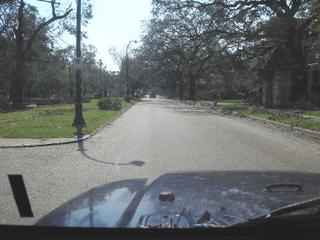
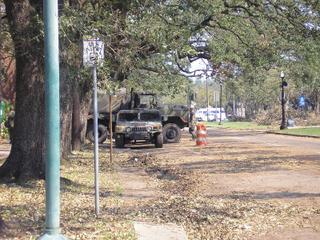
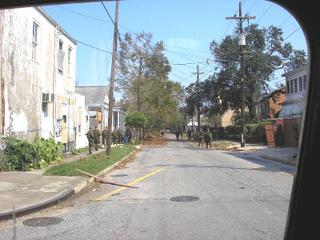
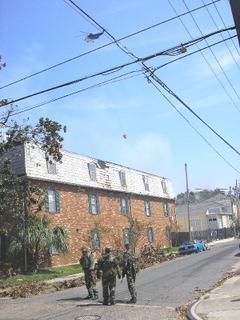
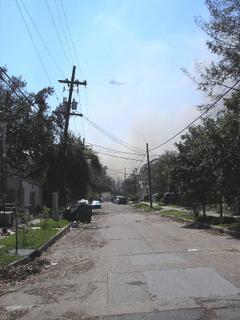
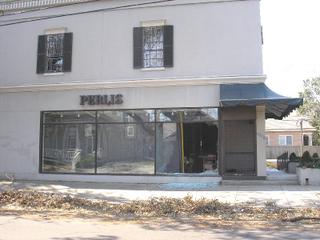
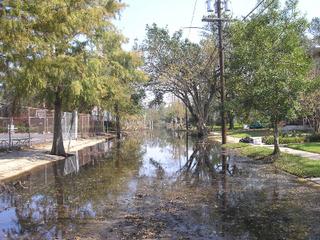
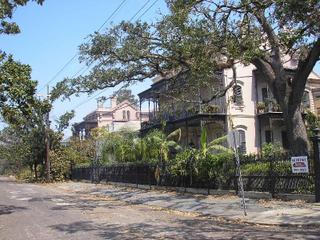
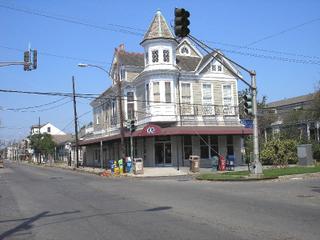
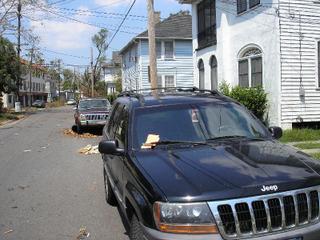
And notice the parking ticket.
He writes about having a soldier check his ID "The soldier while examining my ID, explained that there was a pocket of looting happening and that the troops were "taking care of it". He passed me through, but before I drove on , this soldier - probably only 18 - began apologizing to me. "I'm so sorry that we didn't get here sooner." I kept telling him to not be sorry, and thanked him over and over for being here now." He also provides this update on street conditions: "Remarkably St. Charles is fairly clean. The Parish had obviously opened up the road, but it was weird, there are more trees down in Jeff. On St. Charles I saw NO evidence of the looting of homes . . . Streets that I traveled on: State, Nashville, Prytania, Jefferon, Magazine, Jackson, Carrollton, Palmer, Calhoun, 1st, Camp, Napoleon, Broadway, and some minor side streets. All appeared the same. There was only one home that I saw which was caved in - probably termite infestation. Also, I saw NO evidence of cars broken into. My overall takeaway from this first foray into the city is that much of the looting in at least these residential areas is overblown. The actual hurricane damage is relegated to downed trees. There is effectively only light to moderate roof damage which is pretty much the same thing we've seen along the river in Jefferson Parish. Oh yeah, St. Joe's Bar looks like it could open tonight."
Here are the photos:
I think this says "Keep the Faith" which could be New Orleans' motto now.











And notice the parking ticket.
Great Line of the Day
From our favourite president -- I mean Jefferson Parish president Aaron Broussard -- speaking to the Today Show: "So I'm asking Congress, please investigate this now. Take whatever idiot they have at the top of whatever agency and give me a better idiot. Give me a caring idiot. Give me a sensitive idiot. Just don't give me the same idiot."
There is a lot of truth to this, isn't there? I know what he means.
We all screw up in our jobs sometimes -- in New Orleans, of course, the screwups were monumental and deadly. But if we just CARE about what we do, rather than caring only about lawsuits and asscovering, well, at least then, our errors will be made on the side of humanity. . .
For example, last week, it might have turned out to have been a mistake for FEMA to let into the city all those hundreds of people who wanted to help, the firefighters from Houston and the rescue boats from Florida and the bus drivers from Chicago and the Red Cross workers and the Cuban doctors -- yes, they might have got themselves shot at or needed rescuing themselves or they might have been drowned themselves, some of them.
But in the end, they couldn't possibly have harmed any one more than FEMA did by not being there at all. And so in the end, the "error" of letting them in would have been forgiveable because it would have been an error on the side of humanity. It would have been the mistake of a caring idiot.
There is a lot of truth to this, isn't there? I know what he means.
We all screw up in our jobs sometimes -- in New Orleans, of course, the screwups were monumental and deadly. But if we just CARE about what we do, rather than caring only about lawsuits and asscovering, well, at least then, our errors will be made on the side of humanity. . .
For example, last week, it might have turned out to have been a mistake for FEMA to let into the city all those hundreds of people who wanted to help, the firefighters from Houston and the rescue boats from Florida and the bus drivers from Chicago and the Red Cross workers and the Cuban doctors -- yes, they might have got themselves shot at or needed rescuing themselves or they might have been drowned themselves, some of them.
But in the end, they couldn't possibly have harmed any one more than FEMA did by not being there at all. And so in the end, the "error" of letting them in would have been forgiveable because it would have been an error on the side of humanity. It would have been the mistake of a caring idiot.
Monday, September 05, 2005
Line of the day, but not a great one
Editor and Publisher reports on a visit by Barbara Bush to the evacuees in Houston. She said "What I’m hearing which is sort of scary is they all want to stay in Texas. Everyone is so overwhelmed by the hospitality. And so many of the people in the arena here, you know, were underprivileged anyway, so this--this (she chuckles slightly) is working very well for them."
Catherine's dog and cat photos
In Comments to the last post, Catherine supplied a great link to a batch of AP dog and cat photos by photographer Roger deForest. Here are my favorites:







And Snowball is safe! If you read the CNN story in my last link, it described a little boy in despair at having to leave behind his dog Snowball -- well, according to Unquiet Mind (who also posted the dog photos), Snowball was rescued after all and is safe.
And Snowball is safe! If you read the CNN story in my last link, it described a little boy in despair at having to leave behind his dog Snowball -- well, according to Unquiet Mind (who also posted the dog photos), Snowball was rescued after all and is safe.
The innocents
For me, personally, I think the worst piece of video I saw all week was one where an elderly man was taken off a roof by a boat -- and his dog was left behind. To starve, or to drown, I guess.
The dog stood there in the sun watching as the boat left.
Why would I get upset at the abandonment of a dog, when so many people died? Maybe because in some essential way the dogs are the ones most innocent. We people have some capacity to act independently, to decide what to do, to leave or to stay. Our dogs do not -- they are just with us, accepting whatever we decide for them, remaining loyal and steadfast. Its terrible when the faith they have in people is betrayed, however necessary such a choice is.
This CNN story talks about how horrible this week has been for pet owners: Evacuees anguished at leaving pets behind It quotes one rescuer saying "One woman told me 'I've lost my house, my job, my car and I am not turning my dog loose to starve,"
A CTV story last week covered a group who were hiding in an apartment in New Orleans. One of the people there was a man with three dogs -- they swam together through the flooding for 12 or more hours until this group of people found them. He was crying when he talked about how he did not know what he would do next but he would not be separated from his dogs.
Yes, I agree.
My husband and I talked this week about disaster plans, and front and centre we agreed we could never make a plan which did not include our dogs.
Two sites I will be checking: the ASPCA has a hurricane diary where they keep people informed about their shelter activity. And Petfinder.com is posting reports on how animals are doing. They have crews out looking for standed animals.
Maybe they rescued that dog off that roof. I can hope, can't it?
Three score and ten are given to man,
But ours is a much briefer span.
So, though I give you all my heart,
The time will come when we must part.
But all around you, you will see,
Creatures that speak to you of me;
A tired horse, a hunted thing,
A sparrow with a broken wing ...
Pity - and help (I know you will)
And somehow, I will be with you still;
And I shall know, although I'm gone,
The love I gave you lingers on.
(- author unknown)
The dog stood there in the sun watching as the boat left.
Why would I get upset at the abandonment of a dog, when so many people died? Maybe because in some essential way the dogs are the ones most innocent. We people have some capacity to act independently, to decide what to do, to leave or to stay. Our dogs do not -- they are just with us, accepting whatever we decide for them, remaining loyal and steadfast. Its terrible when the faith they have in people is betrayed, however necessary such a choice is.
This CNN story talks about how horrible this week has been for pet owners: Evacuees anguished at leaving pets behind It quotes one rescuer saying "One woman told me 'I've lost my house, my job, my car and I am not turning my dog loose to starve,"
A CTV story last week covered a group who were hiding in an apartment in New Orleans. One of the people there was a man with three dogs -- they swam together through the flooding for 12 or more hours until this group of people found them. He was crying when he talked about how he did not know what he would do next but he would not be separated from his dogs.
Yes, I agree.
My husband and I talked this week about disaster plans, and front and centre we agreed we could never make a plan which did not include our dogs.
Two sites I will be checking: the ASPCA has a hurricane diary where they keep people informed about their shelter activity. And Petfinder.com is posting reports on how animals are doing. They have crews out looking for standed animals.
Maybe they rescued that dog off that roof. I can hope, can't it?
Three score and ten are given to man,
But ours is a much briefer span.
So, though I give you all my heart,
The time will come when we must part.
But all around you, you will see,
Creatures that speak to you of me;
A tired horse, a hunted thing,
A sparrow with a broken wing ...
Pity - and help (I know you will)
And somehow, I will be with you still;
And I shall know, although I'm gone,
The love I gave you lingers on.
(- author unknown)
Nature bats last
Here's an interesting article from the San Francisco Chronicle "When camping skills are needed to survive". It speaks to the "culture of emergency preparedness" which I have blogged about.
There is lots of info on the net about survival -- maybe even too much. For example, when I Google "Red Cross survival list" I get 1.4 million hits. But here is a basic supply list:
. . . anybody who spends time in the wilderness is always ready. All they need to do is pull out their backpack. In the different compartments and pockets will be everything they need . . . so they can leave at any moment. So if a natural disaster hits by surprise, like an earthquake, for instance, it can take about five minutes to react to it -- haul out the backpack and camping gear . . .
There is lots of info on the net about survival -- maybe even too much. For example, when I Google "Red Cross survival list" I get 1.4 million hits. But here is a basic supply list:
Water (four liters per person per day)Most important, perhaps, would be just to THINK about this in advance, to make a plan.
Food (for three days to a week)
first aid kit
camp stove or barbeque
package of important records (health numbers, list of medications, credit card numbers, relative's addresses, etc.etc)
cash for a week
phone
disaster kit containing things like an emergency preparedness manual; flashlight and extra batteries; radio; waterproof matches; candles, plastic garbage bags and zip-lock bags, waterless antibacterial hand soap, disinfectant, aluminum foil, can opener etc.
Sunday, September 04, 2005
After all these years . . .
Sigh!
Parents and coaches of a Calgary junior soccer team are angry after a Sikh player was barred from a game for insisting on wearing his religious headscarf . . . "I am told by the referees here that this is a FIFA rule," said Michael Smith, referring to soccer's international governing body . . . But [Calgery coach] Moretti said he discovered the federation has no such rule.Oops! There is ome rule against wearing "decorative" pieces (ie jewelry) but the Sikh headscarf is hardly that. I thought everybody knew that by now.
Al Gore - the president they should have had
As some other blogger said, people face disaster with the president they have rather than the president they might want.
Here is the president they should have had, showing what decisive action can do, as reported in this Knoxville News Sentinel story Haven from fury - Mercy Flight Brings Evacuees to ET
They saw nature's unmatched fury up close. Now they would see unbridled human compassion. About 140 people - mostly elderly and infirm - arrived Saturday at McGhee Tyson Airport on a chartered mercy flight from hurricane-ravaged New Orleans, welcomed to East Tennessee by a bright sun and a host of medical professionals straining at the reins to help their fellow human beings without regard to whether they were on the clock. The displaced hurricane victims came to Tennessee on a hastily arranged flight, accompanied by doctors and carrying whatever they had in boxes, bags or, in one case, an old suitcase tied up with rope. Former Vice President Al Gore arranged the flight and was on board, but he declined to take credit for the airlift, fearing it would be "politicized." [Emphasis mine] The patients and evacuees arrived aboard an American Airlines MD-80 about 3:15 p.m. The unloading process took almost two hours, as some walked hesitantly down a staircase beneath the rear of the aircraft. Others were rolled down a ramp from the front of the plane to waiting wheelchairs. Personnel from Rural/Metro and the Tennessee Air National Guard volunteered their services, as did others, to get the patients and evacuees loaded onto buses or ambulances . . . One of the doctors on board the flight was Dr. Anderson Spickard of Vanderbilt University Medical Center in Nashville, who said he had a "personal and professional" relationship with Gore. Spickard said Gore called him about 11 p.m. Friday to ask him to participate in the flight. "The jet was chartered," he said. "It was a private effort." Gore chartered the plane, but, Spickard said, "we'll decide who pays for it later." The doctor said the patients on the plane traveled well and added that he was "pleased" with Knoxville and Knox County's response to the call for help. The patients, he said, "didn't know what kindness" they would receive here. Spickard said the plane would leave McGhee Tyson Saturday evening for Dallas, where he would spend the night before making another mercy flight, possibly to Chattanooga, Nashville or Chicago. The plan had been to make two flights Saturday, Spickard said, but delays in getting to Knoxville meant that the plane could not get back to New Orleans before dark. And there are no landing lights at New Orleans International Airport. Mayor Ragsdale said he was touched by some of the heart-wrenching stories the people told him as they disembarked from the plane. One, he said, was a man of 80-plus years who described being on his roof for three days before being rescued. Another was in an attic that almost filled with water. A third was a man who got off the plane barefooted and with obvious skin trauma to his lower legs, who told the mayor of having to stand in water for 2-3 days. "Some folks are mentally exhausted," he said. And, the mayor said, he has been notified that the Knoxville area can expect as many as 1,500 more evacuees in coming days . . . Gore chose not to speak to the assembled media, but he was seen in a black T-shirt and jeans moving rapidly from one side of the plane to the other assisting with the off-loading operation. Forty people aboard the plane were uninjured evacuees, mostly family members of the elderly patients. Two or three children and a dog also were on board.
Subscribe to:
Posts (Atom)